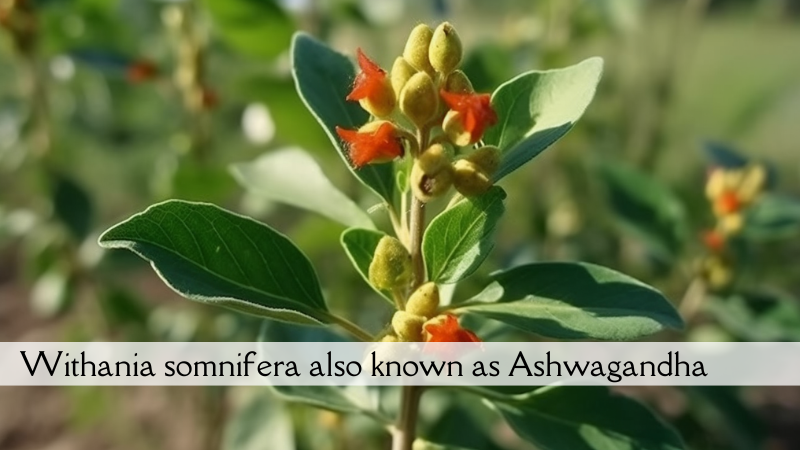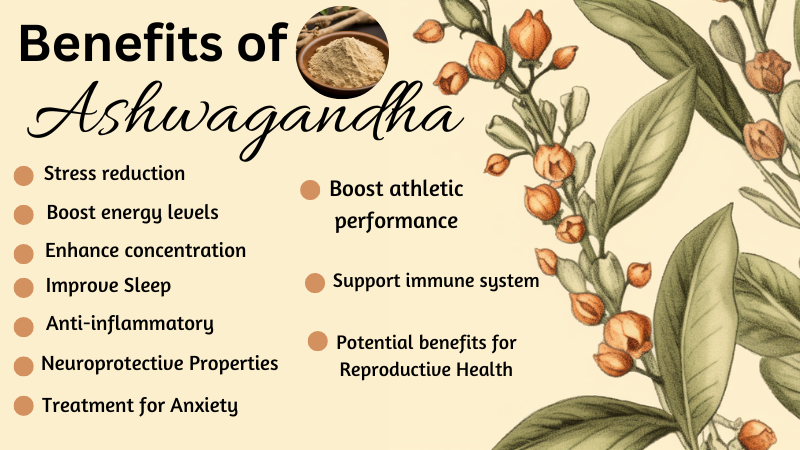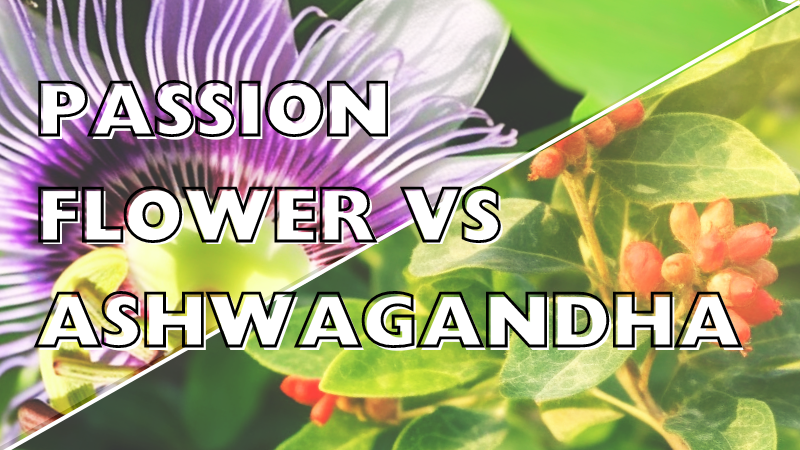In today’s fast-paced world, where stress and anxiety have become commonplace, the search for natural remedies has led many individuals to explore the realm of herbal supplements. Two such contenders have gained significant attention. Join me as we consider these in our passion flower vs ashwagandha comparison.
If you’ve followed our series of articles exploring passion flower and ashwagandha as two separate points of focus, you’ll know that these botanical wonders have been praised for their potential to alleviate anxiety and provide a natural solution to stress relief.
As more people seek alternatives to conventional synthetic treatments, the debate surrounding passion flower vs ashwagandha intensifies.
This article delves into their characteristics, benefits, and how they can work for people with anxiety. As we examine these two herbs we will consider various research that offers insights into their potential effectiveness in promoting a sense of calm and tranquillity.
Table of Contents
Passion Flower vs Ashwagandha: Overview and Benefits
Passion Flower
Passion flower, also known as Passiflora incarnata, is a mesmerising climbing vine known for its intricate beauty and medicinal properties.
As we trace its roots to the southeastern United States, Central, and South America we come to learn that it has long been regarded as a natural medicine.
Known for its naturally calming effects, native tribes across the Americas harnessed the plant as a sedative. This application is something that caught the attention of the Spanish Conquistadors during the 16th century. 1
To delve deeper into this botanical wonder, let’s explore the myriad benefits of passionflower:
- Stress Reduction
- Passionflower tea contains apigenin, a bioflavonoid, which may enhance the neurotransmitter GABA production. GABA helps reduce excessive brain activity, promoting relaxation, similar to the effects of Valerian root. 2
- Improved Sleep
- Passionflower tea might enhance sleep quality and duration, ensuring a restful night.
- Heart Health
- The flavonoids in this floral tea may assist in maintaining healthy blood pressure. 3
- Rich in Antioxidants
- The tea’s leaf extract provides antioxidants that counteract harmful free radicals, supporting overall health.
- Menopausal Symptom Relief
- Passionflower can alleviate symptoms like mood changes, sleep disturbances, and vasomotor disturbances. It’s an alternative for those who can’t have hormone therapy.
- Benefits for Skin
- Passionflower exhibits the potential for treating inflammation, and microbial issues, and has antioxidant properties. Its effects on various skin conditions need further research, but it’s believed some reactions may be due to impurities in products rather than the passionflower itself. 4
Harnessing the myriad benefits of passion flowers can serve as a holistic approach to well-being in today’s fast-paced world. Its multifaceted advantages not only provide physical relief but also pave the way for mental tranquillity.
As research continues to unveil more about this potent plant, integrating it into your daily routine might just be the natural remedy you are seeking.
We’ve also crafted an article titled ‘What Is Passionflower Tea Good For; 12 Astonishing Facts You Must Know‘ a little while back which we hope helps to better outline the scope of use of passionflower as a tea.
Ashwagandha
Ashwagandha, scientifically known as Withania somnifera, is an evergreen shrub that is native to Asia and Africa. It is one of the most significant herbs in Ayurveda. Ayurveda is considered a traditional form of medicine that is based on Indian principles of natural healing that have been practised for thousands of years. 5
The name “Ashwagandha” is derived from Sanskrit, with “ashwa” meaning “horse” and “gandha” meaning “smell”, which refers to the distinct scent of its root and the traditional belief that consuming the herb might impart the strength and vitality of a horse.
For generations, people have used ashwagandha for its medicinal properties, particularly the roots and orange-red fruit. 6

In Ayurvedic medicine, ashwagandha is considered a Rasayana, which means it helps maintain youth and vigour mentally and physically. The herb is also commonly referred to as Indian ginseng or winter cherry, though it should not be confused with other types of ginseng. 7
Let’s delve into the benefits of Ashwagandha reveals a treasure trove of therapeutic and performance-enhancing properties below:
- Stress Reduction
- Ashwagandha is known to alleviate stress and has adaptogenic properties, which means it helps the body resist physical and mental stress.
- Boosts Energy Levels
- Traditionally used to enhance energy and an anti-stress activity, it has been found to promote cardiovascular health. 8
- Enhances Concentration
- With noted positive effects on cognitive function, specifically on attention, working memory, and mood ashwagandha’s properties of reducing symptoms of anxiety and stress have long been celebrated. 9
- Neuroprotective Properties
- Preliminary evidence suggests that these findings that neuroprotective actions Ashwagandha might have neuroprotective actions are mediated via its antioxidant activity. 10
- Improved Sleep
- Some studies suggest that Ashwagandha can help improve sleep quality.
- Anti-inflammatory
- The herb has been studied for its anti-inflammatory effects, which may hold the key to relief for many sufferers of disease-related inflammatory symptoms.
- Potential Treatment for Anxiety
- Some research indicates that Ashwagandha might assist individuals with anxiety disorders.
- Boosts Athletic Performance
- Research studies found that Ashwagandha root extract enhances cardiovascular endurance and physical performance. A potential natural edge for the competitive types. 11
- Supports Immune System
- Studies have revealed that Ashwagandha extract notably boosted the activity of natural killer cells and elevated cytokine levels, highlighting its potential to support and enhance the immune system compared to a placebo.
- Potential Benefits for Reproductive Health
- Preliminary research observes that Ashwagandha’s powdered root helps increase sperm count, semen volume, and sperm motility for men, and improves sexual function in healthy women.

As we consider the strengths of this plant in our passion flower vs ashwagandha discussion, it is essential to note that while ashwagandha has been traditionally used for these benefits, scientific evidence is still being researched. It’s always recommended to consult with a healthcare professional before starting any new supplement or treatment. The same goes for Passionflower.
Passion Flower vs Ashwagandha: A Sleep Aid For Kids
In the realm of natural remedies, as you can no doubt appreciate, herbs have long been the cornerstone for holistic healing. Among them, passion flowers and ashwagandha stand out. They may even provide some hope when it comes to promoting restful sleep in children.
Now, even though both have been used for centuries in traditional medicine, how do they compare when pitted against each other as sleep aids for kids?
Stress Relief and Herbs – Are They OK for Your Kids?
Researchers studying the effects of stressful situations on children and how certain herbs and herbal remedies may help provide anxiety relief have uncovered some interesting insights. Certain herbs that can help may include ashwagandha chamomile lemon balm, with the positive effects observed including:
Alleviating anxiety
In a study involving 36 patients with generalised anxiety disorder, the herbs effectively treated the condition. While oxazepam acted faster, it caused more performance-based issues. Overall, passion flower is considered a promising treatment for anxiety with fewer side effects warranting further extensive research. 12
Improving Sleep
Considering the limited treatment options for insomnia and sleep disorders, many of the studies conducted had limited participant numbers, and there wasn’t a consistent dosage or preparation method established for treatment. Further research on the effectiveness and safety of passionflower is essential to ascertain its suitability for improving sleep. 13
Rejuvenating a Strained Nervous System
The passionflower contains significant phytochemicals like flavonoids and flavonoid glycosides, which are believed to contribute to its therapeutic effects. Chronic stress, whether physical or psychological, can strain the nervous system, leading to issues like:
- Impaired concentration
- Memory problems, and
- Affective disorders.
The properties of passionflower suggest its potential in alleviating these stress-induced conditions, thereby rejuvenating the strained nervous system. 14

Research indicates that certain herbs, including ashwagandha, chamomile, and lemon balm, can offer benefits such as alleviating anxiety, improving sleep, and rejuvenating a strained nervous system in children.
However, consistent dosages and preparation methods are yet to be established, emphasising the need for further comprehensive studies to confirm these findings and ensure safety.
FAQs
Can I take Passion Flower and Ashwagandha together?
Both are typically deemed safe when consumed as recommended. Yet, a few people might encounter minor side effects like sleepiness or digestive discomfort. It’s advisable, to begin with a minimal dose and slowly adjust upwards if necessary under specialised supervision.
Which is better ashwagandha or ginseng?
Both ashwagandha and ginseng offer health benefits, but their effects can vary. Ashwagandha is typically used for stress relief and improving vitality, while ginseng is often taken for energy and cognitive function. The “better” choice depends on the specific needs and goals of the individual.
What is the strongest anti-anxiety herb?
Choosing which herb is the strongest anti-anxiety herb is a subjective matter, and can vary based on individual responses, but Passionflower and Valerian are commonly recognised for their potent anti-anxiety effects.
Which is better for anxiety valerian or passion flower?
Both valerian and passionflower are effective for anxiety. However, valerian is often favoured for sleep issues due to its sedative properties, while passionflower is commonly used for general anxiety relief.
If my routine with ashwagandha includes passion flower is that okay?
Both ashwagandha and passionflower are considered safe for most people when taken as directed. They are both commonly used for stress and anxiety relief. However, combining multiple supplements or herbs can sometimes lead to unexpected interactions or side effects.
Can I expect inflammation relief with ashwagandha chamomile lemon and valerian?
Yes, ashwagandha, chamomile, lemon balm, and valerian have properties that may help in reducing inflammation. However, individual responses to these herbs can vary so specialist advice is necessary to consider your individual needs.
Conclusion
In the quest for natural remedies to address anxiety and stress, especially in children, the comparison between passionflower and ashwagandha offers valuable insights.
Both herbs have deep-rooted histories in natural medicine, with each boasting unique properties that cater to supporting the broad spectrum of mental well-being needs.
While passionflower provides a gentle calming effect, ideal for mild anxiety and promoting sleep, ashwagandha stands out for its adaptogenic qualities, helping the body to cope with stress.
Did you know that passion flower features in HerbiTea’s delicious Sleepy Tea blend? This is a delightful brew that whispers relaxation and sweet nothings. Just what is needed after a long day.
For parents and caregivers seeking holistic approaches to children’s mental health, understanding the nuances between these two herbs is crucial. We hope that the discussion points covered here help you enter into meaningful conversations with your trusted healthcare professional on the topic.
Ultimately, the choice between passionflower and ashwagandha should be based on your individual needs. And when it comes to your kids, always considering your child’s specific symptoms, and consulting with qualified healthcare professionals is a must.
As the world becomes increasingly stressful, turning to nature’s bounty like passionflower and ashwagandha offers a promising avenue for fostering resilience and tranquillity, even for your young ones.
What are your thoughts and experiences in the Passion Flower vs Ashwagandha discussion? Join the conversation on Instagram and Pinterest!
References
- “Antioxidant activity of aqueous extract of passion fruit (Passiflora edulis) leaves: In vitro and in vivo study” – J. da Silva, C. Cazarin, T. Colomeu, Â. Batista, L. Meletti, J. Paschoal, S. Júnior, M. Furlan, F. Reyes Reyes, F. Augusto, M. Maróstica Júnior, R. Zollner, 17 January 2013 [Science Direct] [Archive]
- “Benefits of passionflower for anxiety and insomnia ” – A. Stinson, D. R. Wilson, 23 November 2018 [Medical News Today] [Archive]
- “What Is Passionflower Tea Good for and Are There Any Side Effects?” – M. Juber, 1 November 2002 [MedicineNet] [Archive]
- “Pharmacological studies on Passiflora sp. and their bioactive compounds” – A. G. Ingale, A. U. Hivrale, 12 April 2010 [African Journal of Plant Science] [Archive]
- “Health Benefits of Ashwagandha, Based on Research” – J. Kubala, F. Spritzler, Last checked 23 August 2023 [Healthline] [Archive]
- “What are the benefits of ashwagandha?” – R. Goldmnan, Last checked 23 August 2023 [Medical News Today] [Archive]
- “Ashwagandha – Uses, Side Effects, and More” – Web MD Staff, Last checked 23 August 2023 [WebMD] [Archive]
- “Effects of Passion Flower Extract, as an Add-On Treatment to Sertraline, on Reaction Time in Patients with Generalized Anxiety Disorder: A Double-Blind Placebo-Controlled Study” – M. Nojoumi, P. Ghaeli, S. Salimi, A. Sharifi, and F. Raisi, Last checked 1 September 2023 [PubMed] [Archive]
- “Passiflora incarnata in Neuropsychiatric Disorders—A Systematic Review” – K. Janda, K. Wojtkowska, K. Jakubczyk, J. Antoniewicz, and K. Żydecka, 19 December 2020 [PubMed] [Archive]
- “An insight to curative effects of AshwagandhaWithania somnifera), an Ayurveda herb” – R. Jain, K. Mathur, 18 July 2020 [Journal of Medicinal Plants Studies] [Archive]
- “Possible Neuroprotective Effect of Withania somnifera Root Extract Against 3-Nitropropionic Acid-Induced Behavioral, Biochemical, and Mitochondrial Dysfunction in an Animal Model of Huntington’s Disease” – P. Kumar, A. Kumar, 23 July 2009 [Journal of Medicinal Food] [Archive]
- “Efficacy of Ashwagandha (Withania somnifera [L.] Dunal) in improving cardiorespiratory endurance in healthy athletic adults” – B. Choudhary, A. Shetty, D. Langade, Last checked 25 August 2023 [PubMed Central] [Archive]
- “Ashwagandha (Withania somnifera)—Current Research on the Health-Promoting Activities: A Narrative Review” – P. Mikulska, M. Malinowska, M. Ignacyk, P. Szustowski, J. Nowak, K. Pesta, M. Szeląg, D. Szklanny, E. Judasz, G. Kaczmarek, O. P. Ejiohuo, M. Paczkowska-Walendowska, A. Gościniak, J.Piontek, 24 March 2023 [MDPI] [Archive]
- “A combination of valerian and lemon balm is effective in the treatment of restlessness and dyssomnia in children” – S. Muller, S. Klement, 17 February 2006 [PubMed] [Archive]
- “Antioxidant activity of aqueous extract of passion fruit (Passiflora edulis) leaves: In vitro and in vivo study” – J. da Silva, C. Cazarin, T. Colomeu, Â. Batista, L. Meletti, J. Paschoal, S. Júnior, M. Furlan, F. Reyes Reyes, F. Augusto, M. Maróstica Júnior, R. Zollner, 17 January 2013 [Science Direct] [Archive] ↩︎
- “Benefits of passionflower for anxiety and insomnia ” – A. Stinson, D. R. Wilson, 23 November 2018 [Medical News Today] [Archive] ↩︎
- “What Is Passionflower Tea Good for and Are There Any Side Effects?” – M. Juber, 1 November 2002 [MedicineNet] [Archive] ↩︎
- “Pharmacological studies on Passiflora sp. and their bioactive compounds” – A. G. Ingale, A. U. Hivrale, 12 April 2010 [African Journal of Plant Science] [Archive] ↩︎
- “Health Benefits of Ashwagandha, Based on Research” – J. Kubala, F. Spritzler, Last checked 23 August 2023 [Healthline] [Archive] ↩︎
- “What are the benefits of ashwagandha?” – R. Goldmnan, Last checked 23 August 2023 [Medical News Today] [Archive] ↩︎
- “Ashwagandha – Uses, Side Effects, and More” – Web MD Staff, Last checked 23 August 2023 [WebMD] [Archive]
↩︎ - “An insight to curative effects of AshwagandhaWithania somnifera), an Ayurveda herb” – R. Jain, K. Mathur, 18 July 2020 [Journal of Medicinal Plants Studies] [Archive] ↩︎
- “Ashwagandha (Withania somnifera)—Current Research on the Health-Promoting Activities: A Narrative Review” – P. Mikulska, M. Malinowska, M. Ignacyk, P. Szustowski, J. Nowak, K. Pesta, M. Szeląg, D. Szklanny, E. Judasz, G. Kaczmarek, O. P. Ejiohuo, M. Paczkowska-Walendowska, A. Gościniak, J.Piontek, 24 March 2023 [MDPI] [Archive] ↩︎
- “Possible Neuroprotective Effect of Withania somnifera Root Extract Against 3-Nitropropionic Acid-Induced Behavioral, Biochemical, and Mitochondrial Dysfunction in an Animal Model of Huntington’s Disease” – P. Kumar, A. Kumar, 23 July 2009 [Journal of Medicinal Food] [Archive] ↩︎
- “Efficacy of Ashwagandha (Withania somnifera [L.] Dunal) in improving cardiorespiratory endurance in healthy athletic adults” – B. Choudhary, A. Shetty, D. Langade, Last checked 25 August 2023 [PubMed Central] [Archive] ↩︎
- “An insight to curative effects of AshwagandhaWithania somnifera), an Ayurveda herb” – R. Jain, K. Mathur, 18 July 2020 [Journal of Medicinal Plants Studies] [Archive] ↩︎
- “A combination of valerian and lemon balm is effective in the treatment of restlessness and dyssomnia in children” – S. Muller, S. Klement, 17 February 2006 [PubMed] [Archive] ↩︎
- “Passiflora incarnata in Neuropsychiatric Disorders—A Systematic Review” – K. Janda, K. Wojtkowska, K. Jakubczyk, J. Antoniewicz, and K. Żydecka, 19 December 2020 [PubMed] [Archive] ↩︎
Last Updated on 6 months by D&C Editorial Team


